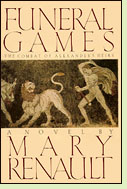Funeral Games
by Mary Renault
Reviewed by David Maclaine

Funeral Games was Mary Renault's last book, finished just a year before her death. If it's the least successful of her novels about the world of the ancient Greeks, Renault in old age is still the best companion imaginable for a journey through the confusion that followed the death of Alexander the Great. There's ample suspense in the twists and turns which raise an assortment of contenders for the place of the departed hero and then undo them, along with moments of pathos that remind us of the human cost of the game of thrones.
Among the players in this funeral drama are Ptolemy, who wisely contented himself with Egypt, and the Persian eunuch Bagoas, who becomes his ally. Other key players include Antipatros, regent of Macedonia, his unscrupulous son Kassandros, the one-eyed general Antigonus and his charming young son Demetrios. These last two take the first steps that will lead them to leading roles in the next stage of the drama. But the age after Alexander's death is the only period in ancient Greek history after the Heroic Age when women get a real chance to make history. That means the women in this story are the first to make a big splash since the Greek Dark Age: Alexander's widow Roxanne and her unwitting, doomed Persian rival, his sister Kleopatra, his mother Olympias, and his cousin Eurydike. Eurydike, a teenaged tomboy making a bold move to hold her own against the veteran generals around her, is among the most sympathetic characters in the novel. Her marriage to Alexander's mentally-retarded brother offers a window of opportunity for her ambition, and her kindness to this hapless man-child, a figurehead for the ambitions of others, makes suspense about their destiny a matter of deeper concern to the reader than the twists of fate that punish so many others. But it is the nature of things that you must not expect many happy endings in a novel called Funeral Games. (1981, 335 pages)
More about Funeral Games at Powell's Books, Amazon.comFuneral Games appears on the list of The 36 Best Historical Novels for a Survey of Ancient Greek History
Other novels about the struggles for power after Alexander's death:
Besieger of Cities by Alfred Duggan (1963; also titled Elephants and Castles), about Demetrius I of Macedon, one of Alexander the Great's successors. See review or more info at Powell's Books
Funeral Games by Christian Cameron (2010), about the brother-sister twins, heirs to a rich Black Sea kingdom, who become fugitives after their mother is killed and must journey west to take shelter with their father's old friend Diodorus, himself in the midst of a violent struggle for power after the death of Alexander the Great; #3 in the Tyrant series. See review or more info at Powell's Books
Stealing Fire by Jo Graham (2010), historical fantasy about Lydias of Miletus, who follows Ptolemy to Egypt after Alexander's death. More info
Nonfiction about the fracturing of Alexander's empire:
Dividing the Spoils: The War for Alexander the Great's Empire by Robin Waterfield (2011). More info
The Greek World after Alexander: 323-30 B.C. by Graham Shipley (2000). More info
The Hellenistic World by F.W. Walbank (1992). More info
Online:
Alexander's Successors: The Diadochi at Livius.org
Back to Novels of Ancient History
Back to Directory of Book Reviews